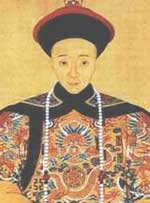Hsien Fêng

Kinesisk kejser 1850-1862.
- Taku, 1860
Reign 1850 - 1862 AD Name of Reign Period : Hsien Feng
Wenzong (Aisin-Gioro) Yi Ning (alias Yi Zhu), Name as Emperor Hsien Feng (XianFeng)
Achievements : Following the disastrous experience of his predecessor Dao Guang the new Emperor Hsien Feng inherited a broken country in turmoil and chaos. After a severe draught and following hardship, large parts of the country-side in Henan and Anhui Provinces revolted in the Taiping (Supreme Peace) movement & Rebellion. The TaiPing Problem would last for over a decade. In that same year of 1856 AD a minor incident with a british ship ("the arrow") resulted in the 2nd Opium War with Britain. With the French immediatly joining in the war, China was once more routed and forced to make concessions. When the chinese did not fully cooperate, the French & British invaded Canton.
Both events left the economy in chaos. Transport on the Sea's and through coastal harbors was halted due to hostile ships in action, while the Rebellion in the Central Provinces had cut communications between the north and the south.
This not only halted internal transport, but made it impossible for the new draft banks to operate, plummeting the economy and leading to local inflation of currency and shortages throughout the nation.
After invading GuangDong Province and taking the City of Canton in the South, next the Foreigners moved on the Imperial Court. Troops landed from ships in the Northern harbors of Port Arthur, WeiHeWei and others attacked Beijing and in an act of vandalism the Emperor's Summer Palace was looted and burnt. The resulting hopeless military situation finally forced Emperor Hsien Feng to Sign the so-called Beijing Treaty of 1860 AD (at Chengde Palace his refuge) in which more treaty ports were extorted and more chinese sovereignty taken away.
However, with the Foreigners standing by and many actively cooperating the Ching could then
To make matters in China even worse, meanwhile Hsien Feng expired in 1861 AD from Ill Health at his Chengde Retreat, leaving few real achievements.
The end of the XianFeng Period saw a once prosperous economy realing from the effects of two wars and two rebellions in rapid succesion. Its lands and economy newly opened to Foreign Exploitation, a new Era was dawning on China, a traditional society and country that would never be as before.
turn their attention to the Taiping Rebellion, which was undoing the connections of the Empire. The Taiping Revolt was finally put down in 1864 AD.
Shortly following, a second seperate rebellion, the Nian Rebellion of Peasants was similarly obliterated, finally restoring some form of order within the beaten Chinese Empire.
To make matters in China even worse, meanwhile Hsien Feng expired in 1861 AD from Ill Health at his Chengde Retreat, leaving few real achievements.
The end of the XianFeng Period saw a once prosperous economy realing from the effects of two wars and two rebellions in rapid succesion. Its lands and economy newly opened to Foreign Exploitation, a new Era was dawning on China, a traditional society and country that would never be as before.
Hsien Feng's best legacy may lie in the highpoint of chinese architectural style achieved under his reign and shortly after.
Hsien Feng did his best to carry forth the Ching Policy of integrating all Nationalities of Chinese vast Society which included such diverse regions as Annam (current day North Vietnam),Mongolia, Korea, Manchuria, Burma,Nepal and Tibet. The reign of Emperor Hsien Feng was probably too short and his talents to few for him to make a true impact through power or person..
Death & Succession : Emperor Hsien Feng was married to Empress Niuhulu, with the two having 1 young son.
After the death of Hsien Feng at age 31 , leaving his chosen son and Crown Prince WenZhong (Tai Chun) too young as a
heir, Empress Niuhulu became the Eastern Dowager Tsu An by Imperial Decree (issued shortly before death). Hsien
Feng's "Secondary Consort" Tzu Hsi (also known as Cixi the Dragon lady) became Western Empress Dowager. Both
Dowagers were supposed to be supported by an 8 member Imperial Staff of Advisors, all with the aim of raising the Young
Son of Hsien Feng and Tsu Ann to be the Mature Emperor of China.